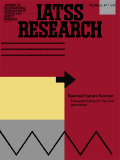
IATSS Research
Scope & Guideline
Elevating engineering insights to enhance urban living.
Introduction
Aims and Scopes
- Traffic Safety and Accident Prevention:
The journal emphasizes research that explores various factors affecting traffic safety, including driver behavior, environmental influences, and infrastructural elements. Studies often utilize statistical models and machine learning techniques to analyze accident data and propose safety measures. - Transportation Behavior and Psychology:
Research investigating the psychological aspects of transportation, such as driver behavior, pedestrian interactions, and user acceptance of new technologies (e.g., autonomous vehicles), is a core focus. This includes understanding attitudes, perceptions, and behavioral changes in response to different transportation policies. - Urban Mobility and Infrastructure Development:
IATSS Research addresses urban transportation systems, focusing on the interplay between public transport, pedestrian facilities, and cycling infrastructure. Papers often explore strategies for enhancing urban mobility and sustainability, particularly in developing countries. - Technological Integration in Transportation:
The journal covers studies on the application of advanced technologies in transportation, including automated systems, machine learning for traffic analysis, and innovative transport solutions that aim to improve safety and efficiency in road usage. - International Perspectives on Traffic Issues:
With papers spanning various geographic contexts, IATSS Research provides insights into transportation challenges and solutions globally, particularly in low- and middle-income countries. This includes comparative studies that highlight different cultural and infrastructural influences on traffic safety.
Trending and Emerging
- Impact of COVID-19 on Transportation:
Research examining the effects of the COVID-19 pandemic on travel behavior, traffic patterns, and safety has gained significant traction. This theme explores how the pandemic has altered commuting, public transport usage, and overall road safety. - Integration of Machine Learning and Data Analytics:
There is an increasing trend towards the application of machine learning and advanced data analytics in transportation research. Studies are leveraging these technologies to improve predictive models of traffic safety and analyze complex datasets for better insights. - Sustainability and Carbon Neutrality in Transportation:
With a growing emphasis on environmental concerns, research focusing on sustainability practices within the transportation sector, including carbon neutrality and the role of electric vehicles, is on the rise. This reflects a broader societal move towards sustainable practices. - Child and Vulnerable Road User Safety:
Research dedicated to the safety of children and vulnerable road users, such as pedestrians and cyclists, is becoming more prominent. This includes studies on specific safety measures and behavioral interventions aimed at protecting these groups. - Behavioral Insights into Autonomous Vehicle Acceptance:
As autonomous vehicles become more prevalent, studies exploring public perceptions and acceptance of these technologies are emerging as a key area of interest. Research is increasingly focused on understanding the factors that influence user acceptance and the implications for traffic safety.
Declining or Waning
- Traditional Traffic Engineering Solutions:
Research focusing solely on conventional traffic engineering methods, such as basic signal timing and road design without integrating modern technologies or behavioral insights, has seen a decline. There is a noticeable shift towards more interdisciplinary approaches that encompass safety, behavior, and technology. - Generalized Studies on Traffic Culture:
Broad analyses of traffic culture without specific contextual applications or detailed data have become less common. The journal appears to favor studies with concrete applications and methodologies that directly address safety and behavioral outcomes. - Static Models of Traffic Behavior:
There has been a waning interest in static models that do not account for dynamic factors influencing traffic behavior. Recent trends indicate a preference for more complex, adaptive models that utilize real-time data and machine learning techniques to assess and predict traffic patterns.
Similar Journals
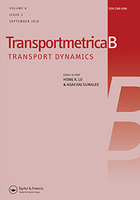
Transportmetrica B-Transport Dynamics
Elevating Scholarship in Transportation ModelingTransportmetrica B: Transport Dynamics is a premier academic journal published by Taylor & Francis Ltd, focusing on innovative research in the fields of transportation dynamics, modeling, and simulation. Established in 2013 and running through 2024, this journal holds a prestigious Q1 ranking in Modeling and Simulation, Software, and Transportation categories, reflecting its commitment to high-quality scholarship. With an impactful presence, evidenced by its Scopus rankings—73rd in Mathematics, 57th in Social Sciences, and 174th in Computer Science—Transportmetrica B serves as a critical platform for researchers, professionals, and students seeking to explore and disseminate groundbreaking findings in transport dynamics. The journal is accessible via open access options, ensuring that its valuable insights reach a global audience. As the field of transport continues to evolve, Transportmetrica B remains at the forefront, championing extensive research and development that address the challenges of modern transportation systems.

Journal of Transportation Engineering Part A-Systems
Exploring the Future of Civil Engineering and Transportation NetworksThe Journal of Transportation Engineering Part A-Systems, published by the American Society of Civil Engineers (ASCE), is a cutting-edge, peer-reviewed journal dedicated to the advancement of knowledge in the field of transportation systems. With an ISSN of 2473-2907 and an E-ISSN of 2473-2893, this journal serves as a crucial resource for researchers, professionals, and students interested in the intricate interplay between civil engineering and transportation networks. Boasting a Q2 ranking in both the Civil and Structural Engineering and Transportation categories, this journal reflects the high-quality research contributing to these vital disciplines. Accessible through open-access options, the journal provides a platform for innovative ideas and research findings from 2017 to 2024, aiming to address contemporary challenges in transportation systems while fostering interdisciplinary collaboration. As an essential outlet for scholarly work in the United States and beyond, the Journal of Transportation Engineering Part A-Systems is committed to enhancing the understanding of complex transportation dynamics and the development of sustainable and efficient infrastructures.
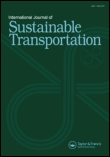
International Journal of Sustainable Transportation
Navigating Towards Cleaner, Greener TransportationInternational Journal of Sustainable Transportation, published by Taylor & Francis Inc, stands at the forefront of research in sustainable mobility, addressing critical challenges within the fields of engineering, environmental science, and urban planning. With ISSN 1556-8318 and E-ISSN 1556-8334, this journal is recognized for its exceptional quality, evidenced by its Q1 rankings across multiple categories including Automotive Engineering, Civil and Structural Engineering, Environmental Engineering, and Transportation, as well as a notable presence in Renewable Energy and Sustainability. Its impact is further amplified by impressive Scopus rankings, securing top positions in various fields, ensuring that it serves as a pivotal resource for researchers, practitioners, and policymakers dedicated to advancing sustainable transportation solutions. The journal actively disseminates cutting-edge research that informs sustainable practices worldwide, thus contributing to the development of greener transportation methods. As it continues its mission from 2007 to 2024, International Journal of Sustainable Transportation remains essential for anyone looking to explore innovative approaches to the transportation challenges of our time.
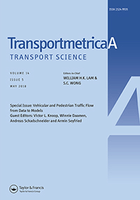
Transportmetrica A-Transport Science
Pioneering Insights for Tomorrow's Transport SystemsTransportmetrica A-Transport Science, published by Taylor & Francis Ltd, is an influential journal at the forefront of transport science research. With an ISSN of 2324-9935 and an E-ISSN of 2324-9943, the journal spans a diverse range of topics within the field of transportation and engineering. Since its inception in 2013, it has aimed to provide a platform for high-quality, innovative research, reflecting significant advancements and challenges in transportation systems. Recognized for its academic rigor, it has achieved a Q1 ranking in Engineering (miscellaneous) and a Q2 ranking in Transportation for 2023, reflecting its impact and relevance in these fields. With impressive Scopus rankings of #31/307 in General Engineering and #31/141 in Transportation, the journal is positioned in the top 90th and 78th percentiles respectively. Though not an open-access publication, Transportmetrica A promotes accessibility of knowledge and strives to foster discourse among researchers, professionals, and students alike, making it an essential resource for anyone invested in the future of transportation science.
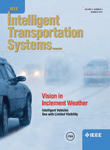
IEEE Intelligent Transportation Systems Magazine
Leading the Charge in Automotive Engineering InsightsIEEE Intelligent Transportation Systems Magazine, published by the IEEE-Institute of Electrical and Electronics Engineers Inc., is a leading journal in the fields of automotive engineering, computer science applications, and mechanical engineering. With an impressive impact factor reflected in its 2023 rankings, this journal sits in the top quartile (Q1) across multiple engineering categories, making it an essential resource for researchers and professionals dedicated to advancing the intelligent transportation systems landscape. The magazine covers a diverse array of topics from vehicle technology innovations to traffic management solutions, aimed at improving transportation efficiency, safety, and sustainability. Since its inception in 2009, the publication has established a solid reputation for disseminating cutting-edge research and practical applications in intelligent transportation, all while remaining an accessible resource for academic and industrial stakeholders alike. Subscribe today to stay at the forefront of transformative transportation technologies!
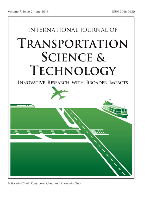
International Journal of Transportation Science and Technology
Innovating transportation science for a better tomorrow.The International Journal of Transportation Science and Technology, published by KEAI PUBLISHING LTD, stands as a pivotal resource in the fields of transportation, automotive engineering, civil and structural engineering, and policy management. With a robust Open Access model since its inception in 2012, this journal provides unparalleled visibility to research that impacts real-world transportation systems and infrastructure. The journal proudly holds a Q1 category ranking in crucial engineering fields, reflecting its high impact and quality of published research. Its diverse scope and comprehensive coverage make it an essential platform for researchers, professionals, and students alike who are eager to contribute to the advancement of transportation science and technology. With impressive Scopus rankings underscoring its relevance in environmental science and social sciences related to transport, the International Journal of Transportation Science and Technology continues to foster innovation and influence policy development globally, addressing the challenges of modern transportation systems.

TRANSPORTATION RESEARCH PART C-EMERGING TECHNOLOGIES
Shaping the Next Generation of Transportation InsightsTRANSPORTATION RESEARCH PART C - EMERGING TECHNOLOGIES is a leading journal dedicated to the exploration and dissemination of innovative solutions in the field of transportation. Published by PERGAMON-ELSEVIER SCIENCE LTD in the United Kingdom, this journal has been pivotal in advancing the understanding of emerging transportation technologies since its inception in 1993. With a robust impact across multiple disciplines, it proudly holds a Q1 status in key categories such as Automotive Engineering, Civil and Structural Engineering, and Computer Science Applications, underscoring its vital role in shaping research and development in these areas. Researchers and practitioners are encouraged to engage with its rich repository of knowledge, which includes rigorous peer-reviewed articles aimed at addressing contemporary challenges in the transportation sector. While it currently does not operate under an Open Access model, the journal remains an essential resource for professionals and scholars committed to the field. With an affiliation to the prestigious Scopus database, TRANSPORTATION RESEARCH PART C stands as a beacon of scholarly excellence, driving the future of transportation technologies.
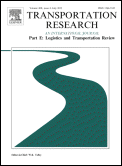
TRANSPORTATION RESEARCH PART E-LOGISTICS AND TRANSPORTATION REVIEW
Pioneering Knowledge in Transportation and Supply Chain ManagementTRANSPORTATION RESEARCH PART E-LOGISTICS AND TRANSPORTATION REVIEW, published by PERGAMON-ELSEVIER SCIENCE LTD in the United Kingdom, is a leading academic journal that focuses on the complementary fields of logistics and transportation. Since its inception in 1997, this journal has been instrumental in shaping the discourse around various facets of transportation systems, supply chain optimization, and logistical efficiency. With an impressive 2023 impact factor and a prestigious ranking, classified as Q1 in key categories such as Business and International Management, Civil and Structural Engineering, and Management Science and Operations Research, it stands at the forefront of research in its domain. The journal is committed to disseminating high-quality research and offers open access options to enhance the visibility and impact of its articles. As it converges its content through 2024, it continues to provide invaluable insights to a diverse audience of researchers, practitioners, and students who are keen on advancing knowledge and practices in transportation and logistics.

PROCEEDINGS OF THE INSTITUTION OF CIVIL ENGINEERS-TRANSPORT
Innovative Insights for Sustainable InfrastructurePROCEEDINGS OF THE INSTITUTION OF CIVIL ENGINEERS-TRANSPORT, published by Emerald Group Publishing Ltd, is a vital scholarly journal dedicated to advancing knowledge in the fields of civil and structural engineering and transportation. With an ISSN of 0965-092X and an E-ISSN of 1751-7710, this journal has been a cornerstone of academic discourse since its inception in 1992, providing a platform for innovative research and case studies up until 2024. Although it currently holds a Q4 quartile ranking in both Civil and Structural Engineering and Transportation categories, its content aims to bridge gaps in existing literature, making it a relevant source for researchers, professionals, and students alike. The journal offers an array of insightful articles that contribute to the evolution of engineering practices and transportation methodologies, fostering a global dialogue among industry stakeholders. While it operates under a subscription model, the journal remains committed to enhancing public access to pivotal findings in engineering disciplines, driving forward the agenda of sustainable and efficient infrastructure development.
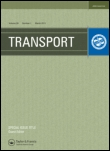
Transport
Driving the future of automotive and mechanical engineering.Transport is a leading open-access journal published by VILNIUS GEDIMINAS TECH UNIVERSITY, specializing in the fields of automotive and mechanical engineering. Since its transition to open access in 2018, the journal has become a vital platform for disseminating high-quality research and innovative practices in transport systems, engineering technologies, and sustainable mobility solutions. With an ISSN of 1648-4142 and an E-ISSN of 1648-3480, Transport is indexed in Scopus with notable rankings, including Q2 in Automotive Engineering and Q3 in Mechanical Engineering for 2023, reflecting its influential presence within these disciplines. Researchers and practitioners are encouraged to contribute to this scholarly community, where their work will reach a robust international audience, thereby advancing knowledge and fostering collaborations in the ever-evolving transport sector. Based in Lithuania, the journal is committed to maintaining rigorous peer-review standards and promoting interdisciplinary studies to address the complex challenges in transportation engineering.